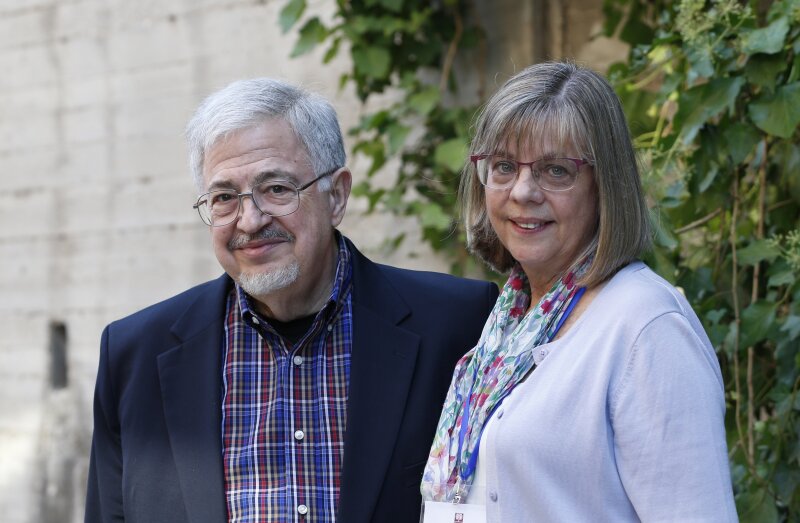
PAPAL ACADEMY GIVES U.S. DEATH ROW CHAPLAIN 'GUARDIAN OF LIFE' AWARD
Carol Glatz/Catholic News Service
10/04/2021
VATICAN CITY (CNS) — Death row inmates in Florida's prisons refer to their 6-foot-by-9-foot cell as their "house," with some having lived in their "house" for 40 years — longer than one Catholic lay chaplain said he has lived in his family home in Tallahassee.

Dale Recinella, a lay Catholic minister in Florida who works
with prisoners on death row, is pictured with his wife, Susan,
who collaborates with him in ministry, in Rome Sept. 28, 2021.
CNS photo/Paul Haring
So when Dale Recinella, the lay minister, goes from cell to cell to offer pastoral care, religious education and spiritual accompaniment, "we go house to house, cell to cell, and that's where we meet them." These are men and women who cannot come out, "they can't even come to the chapel," so the church must go to them.
Recinella has been serving as a Catholic correctional chaplain for inmates on death row and in solitary confinement on behalf of the Catholic bishops of Florida for decades.
With just a few more months until his 70th birthday, Recinella was at the Vatican to be honored by the Pontifical Academy for Life and receive its first ever Guardian of Life Award during a special evening event Sept. 28. The academy was holding its general assembly onsite in Rome and online Sept. 27-29.
Recinella told Catholic News Service Sept. 28 that, as he has moved on to "semi-retirement," the church in Florida is working to make sure that this ministry continues "in a very vibrant and active way" by finding dedicated people to follow in his footsteps.
The "much younger man" who has taken over the physically demanding job of ministry in solitary confinement prisons is "a former NFL linebacker," Recinella said.
The inmates "are very excited that a former pro-football player would want to come and see them," he said. Recinella spent more than 20 years as a successful corporate and finance lawyer, and he said the inmates tease him, telling him he was fine as their chaplain until the church actually got a former football star.
Making sure the men and women on death row receive consistent care and accompaniment tells them they are "important to the heart of the church, and of course it's true, that's why we're there," Recinella said.
Even though he felt called to take care of people on death row, it wasn't easy, he said.
Years ago he was assigned to be "co-spiritual adviser for an infamous serial killer" whose victims had often been college-age women — women the same age as his daughters at the time.
He went to an elderly priest for guidance and begged him: "I can't do this. Every time I think about his victims, I think of my daughters. I can't."
But the priest told him that as a lay Catholic he had already committed to God to do this when he was baptized.
He said the priest told him, "It was up to the inmate to pick who he wanted to accompany him through his death to remind him that Jesus loves him, and you said 'yes' to that when you received your sacraments of initiation into the church, and as you have continued to participate in the Catholic Church through the sacraments, you have already said 'yes.'"
That made it one of the hardest "death watches" he had to prepare for, he said, but he knew from working with the inmate that the man had made a genuine statement of faith when he sang Psalm 23 as he was strapped to the gurney heading for the lethal injection.
People of the Christian faith who believe the death penalty is permissible ascribe to a kind of "hard justice" that shows no mercy, he said. "The world wants vengeance."
He said it is a blessing and the work of God's grace that the Catholic church has been led — starting with St. John Paul II to Popes Benedict XVI and Francis — to finally accept that the death penalty is no longer admissible in the modern day.
"We're called to a better way. And I've watched this transformation," both in the U.S. and other countries, he said, of "our church trying to lead us out of this pit of vengeance as the only solution. It is no solution, the only response to horrible crimes."
Recinella likened the church's evolving stance away from accepting capital punishment as a last resort to society's evolution away from using primitive tools for their needs.
"The pope is saying, as we have left behind chamber pots instead of indoor plumbing and we have left behind all these other things, we need to leave this behind. It's time to live in our own modern age and we have the means" to provide highly secure detention, he said, and "to protect innocent people in society without the state killing anybody."
By protecting the life and dignity of these men and women with alternatives like long-term sentencing, it gives them all the time they need "to come to God," especially since it usually takes years of counseling and being free of addictions "before they were able, with a clear head, to think about God."
He said before he began his work in death-row ministry, he had always heard that "'the threat of an execution brings people to God.' No it doesn't. It brings them to their lawyers, to fight not having an execution."
"It's actually a distraction and a drain on their energy to be fighting the death sentence" instead of immediately coming to terms with how they are going to spend their time in prison in constructive ways, he said, particularly in seeking a relationship with God.
-
